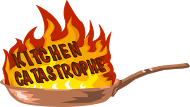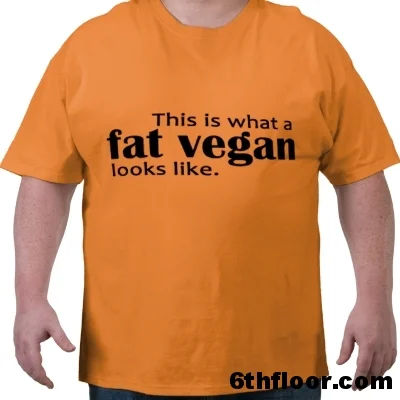Culinary Compendium of Cooking Cant #10: Diets, pt 1.

Welcome one and all to the Culinary Compendium, Kitchen Catastrophe’s blatant band-aid to feed Jon’s never-ending linguistic hunger. For the more he knows, the more he seeks to know, his hunger for words growing like a…well, we were going to say “Wildfire”, but given that Jon has family in California right now, maybe that’s an inopportune choice of metaphors.
In any case, here we explore definitions with a definite slant to them, the diagonal rearrangement the product of Jon’s personal interpretation and some good old fashioned jokes. Speaking of old fashioned jokes, what sits in a man’s pants, and longs to poke the hole it’s poked before? A KEY. That joke is 3,000 years old, so congratulations, you just snickered at a joke that Noah would have found old.
To be fair, the bottom does kind of look like balls.
Today’s definitions, following Jon’s revelation of Monday, will deal with ‘diets’, but perhaps not in the way you’re thinking of. Which is why, of course, we’ll start with that definition.
DIET
1. (n) A formal deliberative assembly, most prominently used in the Holy Roman Empire, with related organizations like the Kokkai of Japan and the Bundestag being translated as…
Uh oh, looks like Martin Luther over here wants to fucking interrupt again.
What? You thought I meant something else? The food one? Oh, of course. Well, see, I had to start with this one, because both words, despite meaning very different things, came from the same place: Latin, getting bored and copying its own notes wrong. See, in Greek, diaita meant one’s “way of living”, in a very general sense. Like one’s “routine”. Latin, doing as it ALWAYS DID, and copying Greece, used their version (diaetia) to refer to “the foods one ate in a day” (since that is generally how one CONTINUES living) and “the work one does in a day” (since that is how you MAKE your living). Governing assemblies would get together, and someone would say “alright, let’s get today’s work (diaetia) out of the way.” which eventually got spelled as dieta, because dies was Latin for day. (Essentially: “Let’s get today over with”) Eventually, they just called the assemblies themselves dietas. Like a hard laborer or military man referring to their job as “the shit”. (“I would, babe, but I’m back in the shit on Wednesday. Won’t be out till next Tuesday.”) Assembly aside out of the way, we can track the evolution of the FOOD term “diet” through the following steps:
2. (n) The foods one consumes in a day, and, more broadly, over most days. Technically encompassing of all the ingredients and methods one uses in a given time period.
3. (n) The foods consumed by a community in general, including specific ingredients and methods. (See CUISINE)
4. (v) To consume food based on specific principles, or consisting of specific parameters.
5. (n) A daily regimen of foods consumed based on specific principles, with the intent of losing weight.
Definition 5 is the predominant modern context of the word. When someone says “I’m going on a diet”, we don’t say “You already have a diet.” (Well I do, but I’m a pedantic asshole.) However, that is NOT what today’s post is about. We’re not going to talk about the many, MANY various diets proposed to help one lose weight. Instead, we’re going to focus on definition 4 today: consumption patterns defined by parameters. Things like “I’m on a vegetarian diet”, “gluten-free”, or “child-only”. Why do so many of these diets exist? Partly because many people possess varying food ALLERGIES or INTOLERANCES, and others have specific religious or moral reasons they avoid specific foods. We’ll have to put off the conversation on Allergies and Intolerances till next week, as it’s a topic with some big facets, caveats, and confusions, all of its own, and I’ve already gotta make fun of a couple religions today, so no need to piss everybody off at one time, eh? Better to spread it around a little.
THE DIETS
GLUTEN-FREE
1. (adj) a descriptor meaning that a food contains no gluten. Duh.
2. GLUTEN: (n) an elastic protein found in wheat and grains (barley, rye, oats, wheat, etc), that allows their flours to add better structure to doughs made from them. As such, anything that doesn’t include a wheat or grain is, by definition, already gluten-free. (Note, Corn and Rice have proteins that are called glutens, but are not true glutens.)
3. (n) a diet used to avoid foods with gluten. Again, duh. The reason for such a diet varies, but often comes down to this: recent medical advances have determined that roughly one out of every eight to ten people may have a gluten sensitivity, intolerance, or allergy. A number that has allowed millions of people to claim such issues without consulting medical professionals. Tragically, the issues can be hard to pinpoint for professionals, so it’s not uncommon for them to fail to diagnose some cases, furthering the belief that ANYONE could be gluten-intolerant.
Even one of Superman's two dads!
(He's not, before you Google it. He just stopped eating Gluten to lose weight.)
Also, holy Shit, I could've used him for the Noah line earlier! Damnit!
HALAL/HARAM
1. (adj) “Halal” is anything that falls within traditional Islamic law, but is particularly used to describe foods that follow Islamic Dietary laws. Briefly, the following foods are forbidden, or “haram”: foods containing blood, any pork products, alcohol of any form, and animals killed in an ‘unclean’ way. (Generally, anything other than a quick, relatively painless death using a blade or hunting weapon.) So your Muslim friend can have a burger just fine (depending on how the cow was killed), but has to wave off the beer-battered onion rings.
Two of the more interesting rules are: first off, if there’s literally nothing else and you need to eat, then it’s fine. It’s no sin if it’s necessary. Second, if the kill of the animal was dedicated to any OTHER God, then it is haram. I guess Allah just doesn’t like sharing.
KOSHER
1. (adj) Any food product that falls within the Kashrut, the Jewish Dietary Laws. Jewish dietary laws are…more complex, so let’s try and blaze through them pretty quick:
-Eat only animals of the land that chew cud and have cloven hooves (except Rabbits, Camels, and Pigs.), eat only fish that have fins and scales, birds are fine unless they’re predators, and other than these four, bugs aren’t fine.
-Blood is forbidden
-The milk and eggs of anything permitted is permitted.
-If the animal was sick, it’s unclean, as is its milk or eggs.
-Animals must be slaughtered a specific way.
-you can’t cook dairy and meat together.
And a spree of more fiddly rules about who can slaughter the animal, the kinds of cooking utensils you can use, etc.
So your Jewish Friend can have a burger, but not a Cheeseburger or Bacon burger. And he can get plastered on wine, unlike your Muslim buddy. Also, Kashrut acknowledges that it is subservient to pikuach nefesh, the Jewish legal tradition that it’s better to live and beg forgiveness than die trying not to sin. So BOTH of the Western dietary law sets include a “unless you’re dying, in which case, fuck the rules, get better buddy” clause.
"Sending my thoughts and prayers!"
LACTOSE INTOLERANT
1. (adj) being intolerant of lactose, a kind of sugar found in milk. Causes people to become queasy or ill after consuming dairy. We’ll discuss this more next Thursday.
PESCETARIAN
1. (adj) a diet consisting of mostly VEGETARIAN choices, but making an allowance for Fish. Interestingly, this position has a theological backing: Catholicism forsakes “meat” on Fridays during Lent, a prohibition that does not extend to fish. According to the catholic church, only land animals give “meat”. Fish do not. Then again, it also ruled that beavers and alligators are fish, so clearly their positions are questionable.
There's certainly something...fishy there.
(Actually, it's Canada's fault. Catholic Canadian Fur Trappers didn't have access to fish, so they petitioned the Pope that, since beavers swim and have scaled tails, could they count?)
VEGAN
1. ~ISM (n) vegetarianism with some backbone.
2. (adj) a diet free not only of meat, but of animal products in general. So, basically, no meat, no dairy, no eggs. Some vegans, but not all, also forego foods that use animal products during production, or any products that utilize animals in their creation. The term was invented in 1944 in England, an offshoot of the Vegetarian Society that had existed for roughly 97 years. (Note: vegetarians and vegans, though not using those names, have been recorded for millennia. Several prominent Greek philosophers were vegetarians.)
VEGETARIAN
1. (n) Someone without the moral (and dietary) fiber of a vegan, but without the sheer moxie of the meat-eater.
2. (adj) a diet that foregoes the consumption of meat, typically permitting animal products such as eggs, and dairy. (Though some vegetarians refuse to consume cheeses that use ‘authentic’ rennet, the coagulating agent used to create many cheeses, such as Parmesan. While some rennets can be made microbially, the authentic and original source is…cow stomachs. Hence their refusal.)
3. Contains the subclasses of OVO-VEGETARIAN (one who DOES consume eggs, but not milk), LACTO-VEGETARIANS (who consume milk, but not eggs), and OINKO-VEGETARIAN (ones who consume too much, because they are pigs.)
A trick they take pride in, since they can't eat any of the really calorie dense foods.
There. Don’t we all feel better, knowing what a distinguishes a Vegan or Vegetarian? I know I do. Well, did. I’ve known this shit for years.
Afterword
In order to drive home some basic etiquette here: There are numerous reasons someone may have dietary restrictions: medical issues, religious tenets, or personal moral beliefs. None of those reasons is a good reason to mock someone. Yes, there are plenty of vegans who act in a snooty or superior way, just like there are plenty of old church ladies who act in the exact same way for the exact same reason: they feel they’ve reached a higher moral plane than others, and forget to pack their humility into their carry-ons.
Some people adopt these lifestyles for health concerns. Some do it for conservation goals (the production of meat, by caloric necessity, uses more resources than the production of vegetables.) Others refuse to adopt them because of financial ones. Some CAN’T adopt a lifestyle they would prefer due to medical issues. (If you have a soy allergy, it can be very hard to get sufficient protein as a vegan, for example.) Not everyone has the access to groceries that you do, or holds the same moral position.
I’ll leave you with this thought: I am renowned for my love of cured meats, stews, jerkies, steaks, etc. But, I was still almost persuaded to a vegetarian lifestyle by a mere 10 minute podcast, because it showed me how my own moral code deeply endorsed it. I spent days thinking on it, stewing over the results, before accepting that, given my situation at the time, adopting such a lifestyle would simply cost too much in terms of my own happiness. (I couldn’t afford tofu, so I would have been stuck using peanut butter and beans ad nauseam.) Is it internally inconsistent? Yes. But, I mean, come on: this is the author who has multiple fights with himself per post, internal consistency was always going to be a bit of an ask.
I honestly believe programs like “meatless Mondays”, are a good idea: not simply in terms of helping to conserve resources, but in forcing you to try new things, explore new flavors. I also acknowledge that some weeks, I don’t have the moral strength to force myself into it. I’ll take what’s easy, or what I can afford. There’s some shame in that, but it’s MY shame: you don’t get to wield it. Nor should you ever try to use someone’s diet to judge another person. You don’t know what foods are comforting to them, what foods disgusting. Remember, someone’s diet, traced back to the beginning, is, simply, their way of living. Of course mine is different than yours. That doesn’t make you better than me, or me better than you.
Weird Culinary compendium today, sorry. Had a lot to unpack and navigate. I was actually 400, 500 words into explaining allergies and intolerances when I realized I didn’t have the space. Hopefully it’s funny enough, and the last part doesn’t come off as too soap-boxy, but hey, waddya gonna do?
MONDAY: BEEF UP FOR BRISK NIGHTS WITH BEEF STROGANOFF
THURSDAY: JON TALKS TOLERANCE. FOOD INTOLERANCE.











